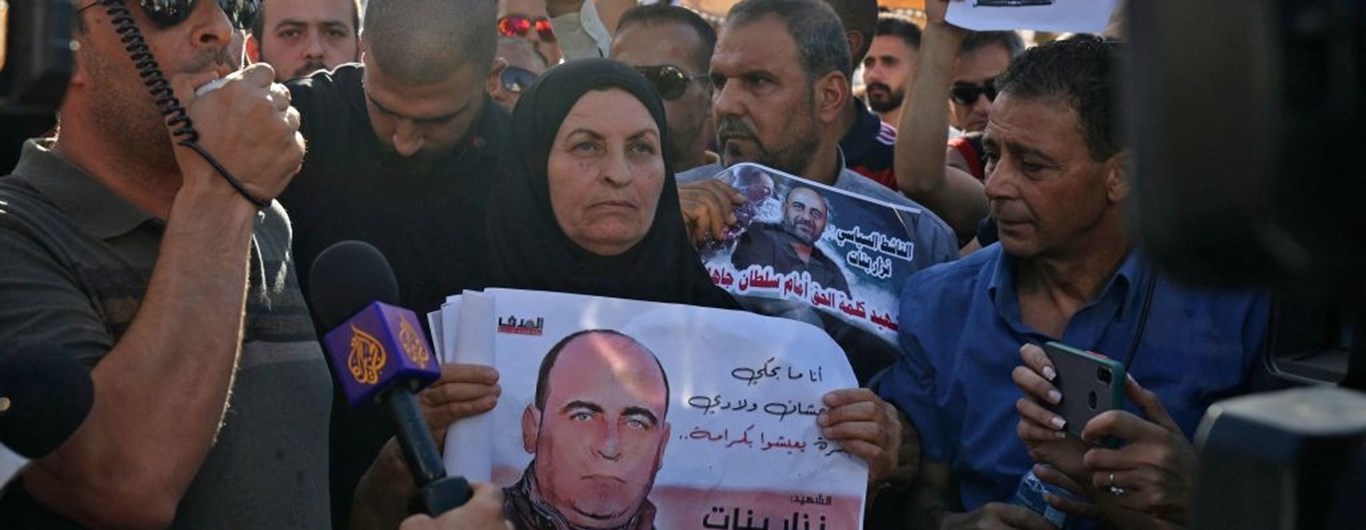Two years after Palestinian dissident Nizar Banat died in the custody of Palestinian security forces, Palestinian authorities have failed to effectively investigate his death and ensure those responsible are held to account, Amnesty International said today. The ongoing trial of 14 officers charged in relation to his arrest has made a mockery of impartiality and fairness with the next hearing scheduled for 26 June before a military court in Ramallah.
Nizar Banat was a prominent activist and outspoken critic of the Palestinian authorities in the occupied West Bank, including accusing them of corruption. On 24 June 2021, a joint unit comprising Palestinian Preventive Security and General Intelligence forces stormed the house where he was staying, beat him with batons, and took him away in a military vehicle. He died around an hour later while being taken to hospital.
“Two years ago, Nizar Banat was arrested and beaten to death while being held in the custody of the Palestinian security forces. Since that time the authorities have failed to hold to account those responsible for his arrest and assault,” said Heba Morayef, Amnesty International’s Regional Director for the Middle East and North Africa.
“The repeated, unjustified delays, the failure to investigate senior officers, and the ongoing campaign of intimidation and harassment against Nizar Banat’s family members all point to an orchestrated ploy by the Palestinian authorities to cover up the crime and evade accountability.”
Palestinian authorities charged 14 low-ranking officers over his death but failed to question or investigate any senior officers. The trial of these officers has been held before military courts which are known for their inherent lack of impartiality and independence. Under human rights law standards, military courts should restrict their jurisdiction to that of military offences by military personnel. To ensure transparency and impartiality, Nizar Banat’s case must urgently be referred to a civilian court.
Nizar Banat’s family harassed for seeking justice
Nizar Banat’s family has faced harassment as a reprisal for continuing to seek justice. Several outspoken family members have been repeatedly arbitrarily detained on spurious grounds or arbitrarily dismissed from government jobs.
Impunity must not be further condoned.
Heba Morayef, Amnesty International
Other family members have told Amnesty International that requests for routine paperwork at government offices have been unreasonably delayed for months. Since testifying before the court, security officials have detained one of Nizar Banat’s cousins on six different occasions on bogus charges, spending between four and 28 days in detention each time.
“The Palestinian authorities have a legal obligation to ensure full protection for all witnesses and victims, including Nizar Banat’s family members. By failing to effectively investigate the complaints of torture, the Palestinian authorities have demonstrated that their pledges to uphold human rights and the rule of law remain empty promises,” said Heba Morayef.
As a party to key international human rights treaties, including the International Covenant on Civil and Political Rights and the Convention against Torture and Other Cruel, Inhuman or Degrading Treatment and Punishment and its Optional Protocol, the State of Palestine has a legal obligation to ensure a prompt, impartial and independent investigation into Nizar Banat’s arrest and killing.
“All those suspected of responsibility for this unlawful killing must be independently and impartially investigated, including those who ordered his arrest. Anyone reasonably suspected of responsibility should be prosecuted in fair trials in civilian courts without recourse to the death penalty. Impunity must not be further condoned,” said Heba Morayef.
Background
Two years ago, the death in custody of Nizar Banat sparked widespread protests across the West Bank, to which the Palestinian security forces responded with excessive force. The protests also addressed wider and systemic human rights violations committed by Palestinian authorities, such as arbitrary arrest and detention, rife torture in detention centres across the West Bank, failure to investigate complaints of torture, harassment of detainees to prevent them from reporting on torture and ill-treatment. These violations are encouraged by the prevailing impunity that security and intelligence officers enjoy and by the lack of international response.
Recent arrests of student activists and dissidents, along with the accounts of torture they shared with Amnesty International, prove that Nizar Banat’s case cannot be seen in isolation but is part of a broader pattern of human rights violations aimed to silence dissent and criticism of the Palestinian authorities.




